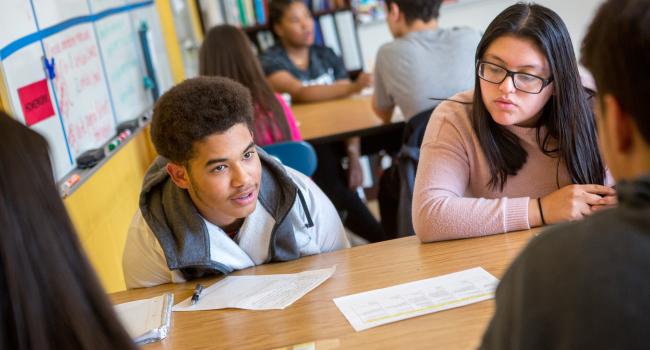Social and Emotional Learning: Best Practices for ELLs

What does social and emotional learning (SEL) look like when implemented effectively with multilingual students and families? Learn more from the resources and case studies below!
Photo credit: Courtesy of Allison Shelley/The Verbatim Agency
Featured Articles
- 10 Strategies for Building Relationships with ELLs
- SEL for English Language Learners: What Educators Need to Know
- 15 Tips to Protect ELLs from Bullying in Your Classroom and School
- Taking a Museum Tour in Spanish: What It Feels Like to Be a Language Learner
- 10 Strategies for Supporting SEL for ELLs: "Grow As You Go"
Research and Reports
Featured Programs
Partnering with Multilingual Families in Brockton, MA
Learn how the public schools in Brockton, MA support partnerships with multilingual families and the impact those partnerships are having.
You Are Welcome Here: Support for Immigrant Students in Dearborn, Michigan
You Are Welcome Here (#DearbornWelcome) is an award-winning 20-minute film from Colorín Colorado highlighting how the Dearborn, MI public school district is helping its immigrant students succeed.
How a Community School Helps ELLs Succeed
Visit Wolfe Street Academy in Baltimore, MD, a school with more than 60% ELLs, to see how this community school is supporting its students and families through programs and services that include dental screenings, food giveaways, after-school activities, and much, much more!
Academia Cuauhtli (Austin, TX)
Academia Cuauhtli (a Nahuatl word that means "eagle") is a grassroots program that the National Education Association describes as "part ethnic studies, part language revitalization, and part professional development." To learn more about Academia Cuauhtli, see the following:
- Academia Cuauhtli and the Eagle: Danza Mexica and the Epistemology of the Circle (Annenberg Institute)
- Academia Cuauhtli Works to Bridge History with Language (KLRU / PBS NewsHour)
What role does culture play?
Dena Simmons
Dena Simmons, Ed.D., is the director of education at the Yale Center for Emotional Intelligence. In these articles and a related TED Talk based on her own experiences, she shares some considerations for implementing Social and Emotional Learning initiatives with diverse student groups.
- 'Is Social-Emotional Learning Really Going to Work for Students of Color?'
- Do Messages About Social-Emotional Learning Harm Students of Color?
- How to Change the Story about Students of Color
- How students of color confront imposter syndrome (TED Talk)






